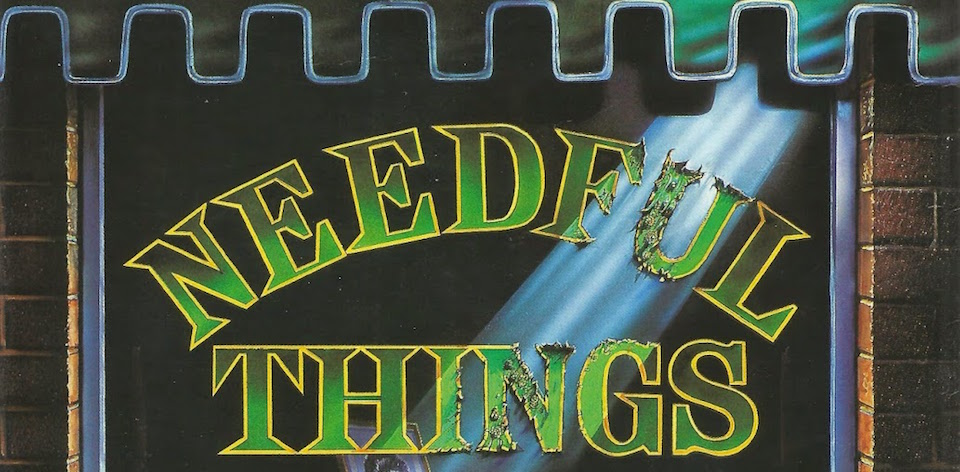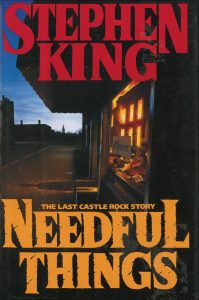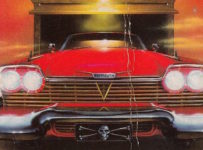Welcome back to the feature column that explores a decent number of Stephen King’s books in the order they were published! (More or less!)* Fair warning: there will be spoilers ahead.
Along with Derry and Jerusalem’s Lot, the not-so-sleepy Castle Rock is the tentpole in Stephen King’s Lovecraftian triptych of fictional Maine towns. Although first appearing in a handful of short stories, The Dead Zone (1979) introduced Constant Readers to the small populace that’s played host to precogs, rabid dogs, children in search of bodies, prison escapes, parasitic twins and possessed cameras. As King says in the introduction to Four Past Midnight, “Castle Rock is really just the town of Jerusalem’s Lot without the vampires.”
In NEEDFUL THINGS – the finale of a loose trilogy with The Dark Half (1989) and the short story “Sun Dog” – the Rock plays host to a new shop run by the charming elderly gent, Leland Gaunt. The shopkeeper exchanges the precious things the townsfolk crave for small amounts of money coupled with innocent pranks. Through several hundred exceptionally detailed pages, King starts to peel back the quaint veneer of the town, introducing us to their dark desires and the chaos they inadvertently chip away at the thin line between sanity and total chaos.
If I made a point of noting that Cujo (1981) was the book King doesn’t remember writing thanks to a cocaine binge, then it would be remiss of me not to mention that NEEDFUL THINGS was the first book written since he got sober. While it should hardly matter at this point, it’s worth noting because so much of this novel is about how far people go to fulfil addictions. A young boy wants a baseball card of Sandy Koufax, Polly Chambers wants the pain of arthritis to stop and hide the secrets of her past, while several others just want to make tangible their dreams of sleeping with Elvis Presley.
Of course, listing them all here would take a column twice as long, as King spends the 700+ pages of the book juggling a baker’s dozen of players with various degrees of neuroses and violent tendencies. Which might be where the large number of voices (“what’s apparently the consensus” says The Guardian columnist James Smythe) who struggled with NEEDFUL THINGS come unstuck. Much of this exposition is a slow moving train going around a circular track, lingering long on the build-up to the chaos but never getting close enough for us to really know any one character more than superficially.
Gaunt himself is thinly drawn, because there’s is never a moment where we believe there’s anything good about his intent. As he draws people into his store, he’s dropping lines like “I’ll have to work like the very devil…” while eating devil’s-food cake in one of King’s less subtle bits of foreshadowing. You can almost picture Vincent Price or Peter Cushing twirling a moustache when he speaks (unless you’ve seen the 1993 adaptation with Max Von Sydow in the role). Compared to Batman’s the Joker in-text, he’s merely an agent of chaos who watches at the world burns around him.
Alan Pangborn is King’s most rounded character here, perhaps because he is one of the handful of King’s recurring characters. The tortured cop, still working through the death of his wife and son, appeared in The Dark Half and “Sun Dog” and acts as a replacement for George Bannerman (who met his end in Cujo). While he’s a bit of a Hamlet for much of the book, cursed with fatal indecision (and Gaunt’s machinations), he’s the one incorruptible voice in a town full of tainted souls. He’s a classic King archetype: a gunslinger who’s biggest threat is his own past.
King uses Castle Rock as a microcosm for America in an era of Reagan, AIDS, unchecked commercialism, and the corruption of the American Dream. Some of this is a bit on the nose – such as the often amusing but over-the-top clash between the Catholics and Baptists – while others characters (such as corrupt and desperate town selectman Danforth “Buster” Keeton) are dangerously close to reality.
Another agent of chaos from the past is bad boy John “Ace” Merrill, recently released from the ‘Shank and in search of his uncle “Pop” Merrill’s treasure. Acting here as Gaunt’s henchman, he serves as the most tangible connection to Castle Rock’s past, having once tortured and been foiled by the kids in “The Body.”
While NEEDFUL THINGS is billed as “the last Castle Rock story” – which was true for several decades at least – it can also be seen as King saying goodbye to a chapter of his life. King quite literally blows up a town full of addicts as he moves into a new phase. When he does, it’s cleverly another dark salesman with a kind of monkey’s paw (Gwendy’s Button Box) and Elevation, a far more optimistic microcosm of modern America.
This was a sidebar from my chronological King to coincide with the debut of Castle Rock: Season 2. Next month: I’m back on track with Christine, the car of evil! Hey, while you’re here, go check out Batrock.net, where my buddy Alex Doenau is running through Stephen King with me.





